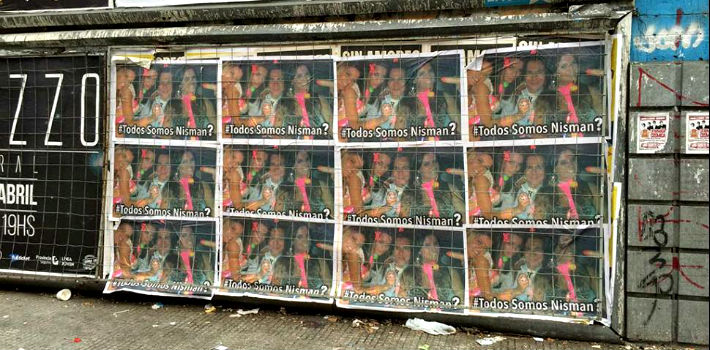
EspañolOn Saturday, February 21, a fire at Argentina’s Presidential palace consumed the records of people who entered and left the building through one of its entrances, Cabinet Chief Aníbal Fernández revealed on Sunday.
The fire, divulged one month after it happened, may have destroyed information relevant to the allegations made by late prosecutor Alberto Nisman that President Cristina Kirchner and senior officials covered up Iran’s involvement in the AMIA bombing in Buenos Aires.
Fernández attributed the incident to an “overload on old wires” but was quick to rule out loss of data. “It may have affected part of the system, but I have been told that everything is backed up. No information was lost,” he told national daily Clarín.
The records burnt correspond to the Casa Rosada entry on Balcarce street, an access point used mostly by low-ranking employees and occasional visitors who must present an ID to enter. The fire did not reach the principal door, where the president, ministers, secretaries, and special guests go through.
However, a source inside the pink-hued seat of the presidency told Clarín: “Almost the whole database was deleted. Most of those who entered [the building] after the fire are ‘new’ people for the system. There are no records.”
The information, if it still exists in back-up form, could verify evidence in the intercepted audio files used by Nisman in his case against the president before being found dead in his apartment on January 19.
According to Nisman’s accusation, Jorge “Yussuf” Khalil, an alleged representative of Iran in Argentina, brokered a deal with the Kirchner administration to cover up for Iranian officials accused of involvement in the 1994 bombing of the Jewish community center in Buenos Aires, which left 85 dead.
The document filed by Nisman shows a phone call took place on September 27, 2013, between Khalil and former government official Luis D’Elía, who was inside the Casa Rosada at the time. In another recording, one day before an official meeting between the foreign ministers of Iran and Argentina, the person alleged to be Khalil is heard to say “[Kirchner] needs the Iranian government, along with the Argentinean government, to announce tomorrow the creation of the Truth Commission,” which established a joint investigation into the bombing.
The future of Nisman’s allegations hinge on the decision of Argentina’s Federal Appeals Court, after federal judge Daniel Rafecas dismissed the accusation late in February. Two prosecutors have since appealed the ruling, so now the higher court will determine if the criminal investigation will proceed.
Anonymous Smear Campaign
Buenos Aires awoke last Friday to images of Nisman plastered around the city center. The posters, placed on trash cans and walls without permission, read “#Are we [really] all Nisman?,” in reference to the slogan used by demonstrators on a march organized to honor the prosecutor on February 18.
#Nisman. ¿En qué imprenta se habrán hecho estos afiches? pic.twitter.com/ajO0HsXO2F
— Facundo Pastor (@facupastor) March 20, 2015
“What printing press could have made these posters?”
The posters purported to show a photo of Nisman at a party with three young women. On March 18, the judge in charge of investigating the prosecutor’s death, Fabiana Palmaghini, accused Argentina’s federal police of leaking the image and other photos, which subsequently went viral on social media.
Simultaneously, Kirchner administration officials began to criticize Nisman’s allegedly ostentatious lifestyle.
“He was given plenty of funds to investigate the AMIA case and he spent them on women and hiring useless employees,” Aníbal Fernández alleged two days after the posters appeared. “During all this time he made a mockery of the 85 victims and over 300 wounded from the attack,” Fernández added, describing the prosecutor as a “scoundrel.”
Argentinean philosopher Santiago Kovadloff questioned the senior official’s statements. “When a dead man comes under attack, it is because the guy is still alive. What do I mean by alive? That Nisman became a symbol for a large part of Argentinean society that the government is trying to behead.”
“They’re trying to kill the dead man,” said the public intellectual, who described the attacks as an aim to “strip away Nisman’s social significance” by targeting his private life.
Kovadloff further criticized the attempt to portray Nisman as a public figure rather than a state prosecutor, and thus deserving of scrutiny into his personal affairs, “which we all know is not the case.”
Translated by Daniel Duarte. Edited by Laurie Blair.
 Versión Español
Versión Español












